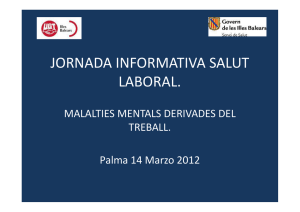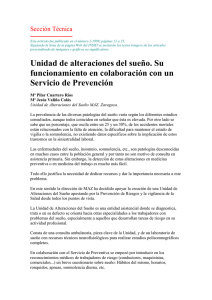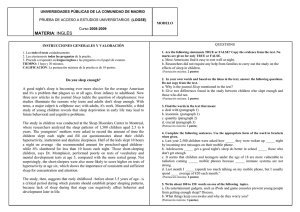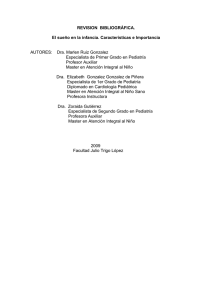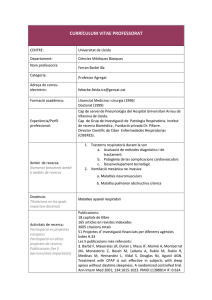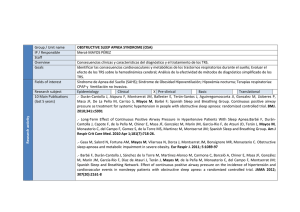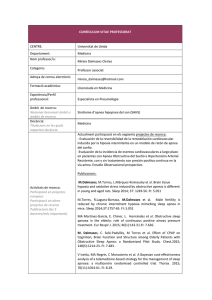PE1068S Sleep Tips for Teenagers - Spanish
Anuncio
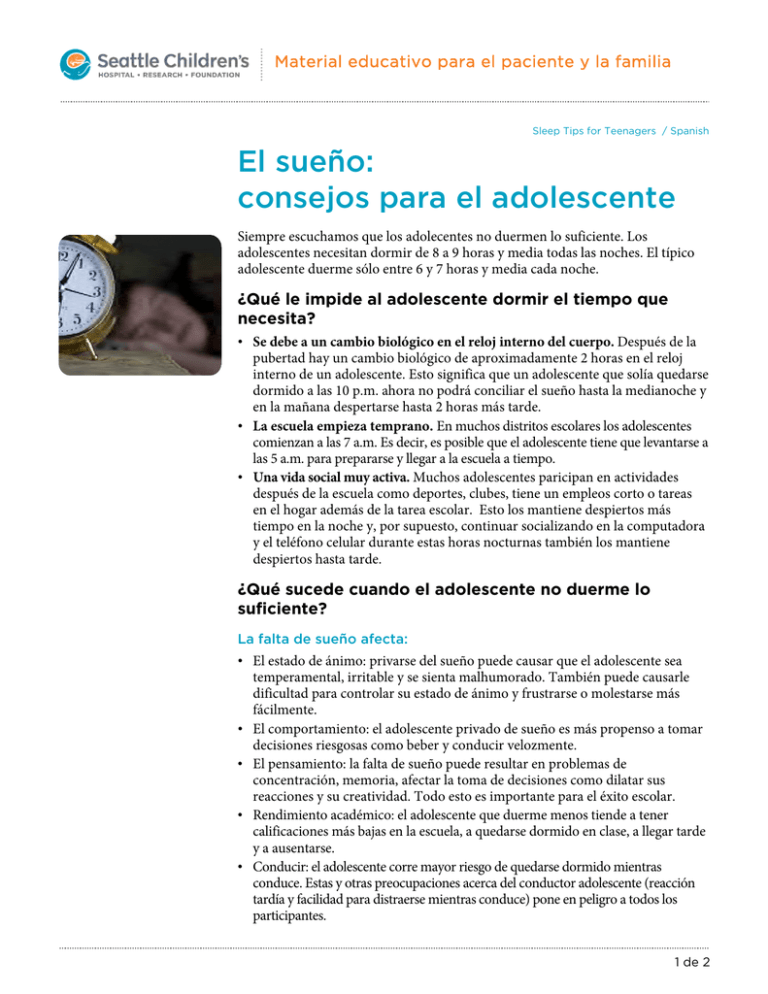
Material educativo para el paciente y la familia Sleep Tips for Teenagers / Spanish El sueño: consejos para el adolescente Siempre escuchamos que los adolecentes no duermen lo suficiente. Los adolescentes necesitan dormir de 8 a 9 horas y media todas las noches. El típico adolescente duerme sólo entre 6 y 7 horas y media cada noche. ¿Qué le impide al adolescente dormir el tiempo que necesita? • Se debe a un cambio biológico en el reloj interno del cuerpo. Después de la pubertad hay un cambio biológico de aproximadamente 2 horas en el reloj interno de un adolescente. Esto significa que un adolescente que solía quedarse dormido a las 10 p.m. ahora no podrá conciliar el sueño hasta la medianoche y en la mañana despertarse hasta 2 horas más tarde. • La escuela empieza temprano. En muchos distritos escolares los adolescentes comienzan a las 7 a.m. Es decir, es posible que el adolescente tiene que levantarse a las 5 a.m. para prepararse y llegar a la escuela a tiempo. • Una vida social muy activa. Muchos adolescentes paricipan en actividades después de la escuela como deportes, clubes, tiene un empleos corto o tareas en el hogar además de la tarea escolar. Esto los mantiene despiertos más tiempo en la noche y, por supuesto, continuar socializando en la computadora y el teléfono celular durante estas horas nocturnas también los mantiene despiertos hasta tarde. ¿Qué sucede cuando el adolescente no duerme lo suficiente? La falta de sueño afecta: • El estado de ánimo: privarse del sueño puede causar que el adolescente sea temperamental, irritable y se sienta malhumorado. También puede causarle dificultad para controlar su estado de ánimo y frustrarse o molestarse más fácilmente. • El comportamiento: el adolescente privado de sueño es más propenso a tomar decisiones riesgosas como beber y conducir velozmente. • El pensamiento: la falta de sueño puede resultar en problemas de concentración, memoria, afectar la toma de decisiones como dilatar sus reacciones y su creatividad. Todo esto es importante para el éxito escolar. • Rendimiento académico: el adolescente que duerme menos tiende a tener calificaciones más bajas en la escuela, a quedarse dormido en clase, a llegar tarde y a ausentarse. • Conducir: el adolescente corre mayor riesgo de quedarse dormido mientras conduce. Estas y otras preocupaciones acerca del conductor adolescente (reacción tardía y facilidad para distraerse mientras conduce) pone en peligro a todos los participantes. 1 de 2 El sueño: consejos para adolescentes Para más información • Neumonología y Medicina del Sueño 206-987-5072 • Contacte al proveedor médico de su niño • www.seattlechildrens.org Servicio gratis de interpretación • Dentro del hospital, solicítelo con la enfermera de su niño. • Fuera del hospital, llame a nuestra línea gratis de interpretación 1-866-583-1527. Menciónele al intérprete el nombre de la persona o extensión que necesita. • Para personas sordas y con problemas de audición marque el: 206-987-2280 (TTY) ¿Qué puedes hacer? Presta atención a tus patrones del sueño y tus horarios • Mantén un horario de sueño: los adolescentes deben acostarse y levantarse casi a la misma hora cada día y también las noches que no hay escuela al día siguiente. Entre una noche y otra no debe haber más de una hora de diferencia. • Los fines de semana: los adolescentes pueden acostarse un poco más tarde los fines de semana pero no dormir para tratar de “reponer el sueño perdido”. Esto hará más difícil volver al horario la siguiente noche. • Siestas: una siesta temprano en la tarde, de 30 a 45 minutos ayuda. Pero los adolescentes no deben tomar siestas largas o demasiado tarde ya que puede interferir con el sueño a la hora de acostarse. Crea un ambiente físico que conduzca al sueño • Asegúrate de que el dormitorio sea cómodo, fresco, tranquilo y oscuro. Una temperatura mayor de 75 grados hace mas difícil quedarse dormido • Usa la cama solamente para dormir. No estudies, leas ni escuches música en cama. • Continúa tu rutina de antes de acostarte. Trata de tener menos actividad 30 a 60 minutos antes de acostarte. Haz algo relajante como leer o escuchar música para tranquilizar tu mente. No veas la TV, no estudies, uses la computadora ni hables por teléfono; tampoco hagas ejercicio ni nada que te “reactive”. Es importante adquirir otros hábitos: Intenta: • Hacer ejercicio con regularidad. Puede ayudar a quedarte dormido y a que el sueño sea más profundamente. • Pasar tiempo al aire libre cada día, especialmente en las mañanas. Exponerse a la luz del sol o luz brillante ayuda a mantener constante el reloj interno del cuerpo. • Ser constante con las comidas y no te acuestes con hambre. Come algo ligero antes de acostarte, pero no una comida completa la hora de acostarse. Evita lo siguiente: • Cafeína: evita comer o beber cosas con cafeína al final de la tarde, incluye sodas con cafeína, café, té, bebidas energéticas o chocolate. • Alcohol: el alcohol interrumpe el sueño y puede hacer que te despiertes durante la noche. • Fumar: fumar interrumpe el sueño. No debes fumar por al menos una hora antes de acostarte (¡lo preferible es no fumar en lo absoluto!) • Somníferos: no uses pastillas ni otros productos para dormir sin receta médica, pueden ser peligrosos y tus problemas de sueño pueden regresar cuando dejes de tomarlos. Seattle Children’s ofrece servicios de interpretación gratuitos para pacientes, familiares y representantes legales sordos, con problemas de audición o con inglés limitado. Seattle Children’s tendrá esta información disponible en formatos alternativos bajo solicitud. Por favor llame al Centro de Recursos para Familias al 206-987-2201. Este volante fue revisado por personal clínico de Seattle Children’s. Sin embargo, como las necesidades de su niño son únicas, antes de actuar o depender de esta información, por favor consulte con el proveedor de atención médica de su niño. © 2011, 2014 Seattle Children’s, Seattle, Washington. Todos los derechos reservados. Neumonología y Medicina del Sueño 5/14 Tr (lv/jw) PE1068S 2 de 2 Patient and Family Education Sleep Tips for Teenagers We all hear that teenagers typically do not get enough sleep. Teens need 9 to 9-½ hours of sleep each night. The average teen gets only 7 to 7-¼ hours per night. What prevents teens from getting the sleep they need? • A biological shift in the body’s internal clock. After puberty, there is a biological shift in a teen’s internal clock of about 2 hours. This means that a teen who used to fall asleep by 10 p.m. will now not be able to fall asleep until midnight. They will also not naturally wake up until 2 hours later in the morning. • Early school start times. Many school districts have teens starting school as early as 7a.m. This means teens may need to get up as early as 5 a.m. to get ready and get to school on time. • A busy social life. Many teens have lots of afterschool events like sports, clubs, part-time jobs, or family chores, in addition to homework that keeps them up longer in the evening. And of course there is ongoing socializing, computer and cell phone use that fills those evening hours and keeps them up late. What happens when teens don’t get enough sleep? Sleep deprivation affects: • Mood – Sleep deprivation can cause teens to be moody, irritable and cranky. They may also have a difficult time controlling their moods and be more easily frustrated and upset. • Behavior – Teens who are sleep deprived are more likely to engage in risktaking behaviors, such as drinking and driving fast. • Thinking – Lack of sleep can result in problems with attention, memory, decision making, reaction time and creativity, all of which are important for success in school. • Academic performance – Teens who get less sleep are more likely to get poor grades in school, fall asleep in school and have school absences and tardiness. • Driving – Teens are at the highest risk of falling asleep while driving. Combined with other concerns about teen driving (slower reaction times, being easily distracted while driving) this can be very dangerous for all involved. What can you do? Pay attention to sleep patterns and schedules • Keep a regular sleep schedule – Teens should go to bed and wake up at about the same time every night. This includes non-school nights. There should not be more than an hour difference from one night to the next. 1 of 2 Sleep Tips for Teenagers To Learn More • Pulmonary and Sleep Medicine 206-987-5072 • Ask your child’s healthcare provider • www.seattlechildrens.org Free Interpreter Services • In the hospital, ask your child’s nurse. • From outside the hospital, call the toll-free Family Interpreting Line 1-866-583-1527. Tell the interpreter the name or extension you need. • For Deaf and hard of hearing callers 206-987-2280 (TTY). • Weekends – Teens can stay up a bit later on weekend nights but should not sleep in on weekends to “catch up” on sleep. This will make it harder to get back on schedule the following night. • Naps – An early afternoon nap of 30 to 45 minutes is fine. But teens shouldn’t nap too long or too late in the afternoon or they’ll have difficulty falling asleep at bedtime. Create a sleep-friendly physical environment • Make sure the bedroom is comfortable, cool, quiet and dark. A room that is warmer than 75 degrees can make it hard to sleep. • Use the bed only for sleeping. Don’t study, read or listen to music on the bed. • Stick to a pre-bedtime routine. About 30 to 60 minutes before bedtime, try to “wind down.” Do relaxing, calming activities such as reading or listening to soothing music to help your mind slow down. Don’t watch TV, study, use the computer, talk on cell phone, exercise or do things that are “energizing.” Here are some more important habits to follow: Try to: • Exercise regularly. Exercise may help you fall asleep and sleep more deeply. • Spend time outside every day, particularly in the morning. Exposure to sunlight or bright lights helps keep your body’s internal clock on track. • Eat regular meals and don’t go to bed hungry. Have a light snack before bedtime, but don’t eat a full meal in the hour before bedtime. Avoid: • Caffeine – Avoid eating or drinking anything with caffeine in the late afternoon or evening. This includes caffeinated soda, coffee, tea, energy drinks or chocolate. • Alcohol – Alcohol disrupts sleep and may cause you to wake up during the night. • Smoking – Smoking disrupts sleep. Don’t smoke for at least an hour before bedtime (and preferably not at all!) • Sleeping pills – Don’t use sleeping pills, or other over-the-counter sleep aids. These can be dangerous and your sleep problems may return when you stop taking them. Seattle Children’s offers interpreter services for Deaf, hard of hearing or non-English speaking patients, family members and legal representatives free of charge. Seattle Children’s will make this information available in alternate formats upon request. Call the Family Resource Center at 206-987-2201. This handout has been reviewed by clinical staff at Seattle Children’s. However, your child’s needs are unique. Before you act or rely upon this information, please talk with your child’s healthcare provider. © 2011, 2014 Seattle Children’s, Seattle, Washington. All rights reserved. 5/14 PE1068 Pulmonary and Sleep Medicine 2 of 2
